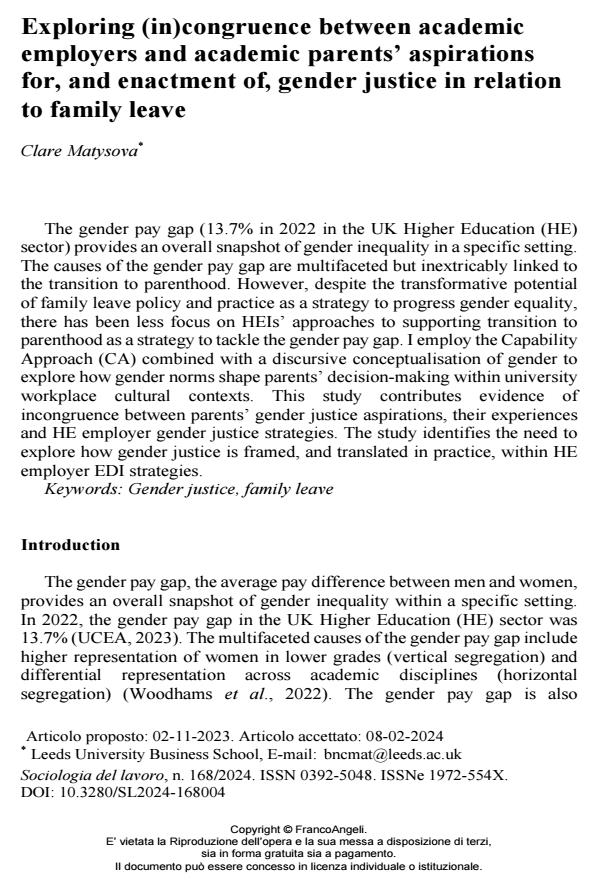Exploring (in)congruence between academic employers and academic parents’ aspirations for, and enactment of, gender justice in relation to family leave
Titolo Rivista SOCIOLOGIA DEL LAVORO
Autori/Curatori Clare Matysova
Anno di pubblicazione 2024 Fascicolo 2024/168
Lingua Inglese Numero pagine 17 P. 71-87 Dimensione file 212 KB
DOI 10.3280/SL2024-168004
Il DOI è il codice a barre della proprietà intellettuale: per saperne di più
clicca qui
Qui sotto puoi vedere in anteprima la prima pagina di questo articolo.
Se questo articolo ti interessa, lo puoi acquistare (e scaricare in formato pdf) seguendo le facili indicazioni per acquistare il download credit. Acquista Download Credits per scaricare questo Articolo in formato PDF

FrancoAngeli è membro della Publishers International Linking Association, Inc (PILA), associazione indipendente e non profit per facilitare (attraverso i servizi tecnologici implementati da CrossRef.org) l’accesso degli studiosi ai contenuti digitali nelle pubblicazioni professionali e scientifiche.
The gender pay gap (13.7% in 2022 in the UK Higher Education (HE) sector) provides an overall snapshot of gender inequality in a specific setting. The causes of the gender pay gap are multifaceted but inextricably linked to the transition to parenthood. However, despite the transformative potential of family leave policy and practice as a strategy to progress gender equality, there has been less focus on HEIs’ approaches to supporting transition to parenthood as a strategy to tackle the gender pay gap. I employ the Capability Approach (CA) combined with a discursive conceptualisation of gender to explore how gender norms shape parents’ decision-making within university workplace cultural contexts. This study contributes evidence of incongruence between parents’ gender justice aspirations, their experiences and HE employer gender justice strategies. The study identifies the need to explore how gender justice is framed, and translated in practice, within HE employer EDI strategies.
Parole chiave:Gender justice, family leave
Clare Matysova, Exploring (in)congruence between academic employers and academic parents’ aspirations for, and enactment of, gender justice in relation to family leave in "SOCIOLOGIA DEL LAVORO " 168/2024, pp 71-87, DOI: 10.3280/SL2024-168004